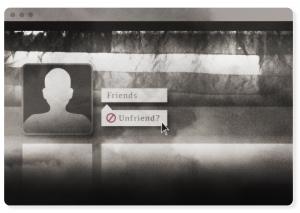As I sit down to write this Dark Devotional, a warning flashes to the left of my screen: “Something’s not right. We’re having trouble connecting, but we’ll keep trying.”
Story of my life, and certainly resonant with the prophetic mission we hold as a baptized people. All around us there are signs that something is deeply wrong, and yet what choice do we have but to try over and over again to connect?
Right after the election of Donald Trump to the presidency, many of my friends posted Facebook statuses saying something along the lines of, “If you voted for Trump, unfriend me now. I will no longer try to build bridges. I will no longer engage in dialogue. I’m done playing nice, and I will fight you and your platform every day and every step of the way.”
I can’t say this wasn’t tempting for me. Truth be told, I still feel a visceral chill run down my spine when I contemplate the fact that people I know and love made what seems to me such a criminally irresponsible choice in the voting booth. But, largely because of my work, a move like that was not an option for me. And ultimately, I’m glad that that particular temptation was removed from me. I work in the church, and the job description at the heart of all my stated job descriptions is to remain open in love to all, and to help create spaces where we all might grow closer to Christ, to compassion, and to the needs of one another. Cutting off and drawing lines in the sand is antithetical to my mission and vocation.
But that’s complicated, right? Because as a baptized Christian, I was anointed “priest, prophet and king” at my baptism. As priest, I am called to act as a mediator between the divine and the earthly: I’m called to cultivate “a gentle interiority,” a place where “God and my fellow humans can meet each other,” as Henri Nouwen puts it.
But as prophet, I am called to listen with my whole being to what God is speaking into our times, even the parts that make me shiver with terror and cut into me with shame. It’s not enough to “just be nice,” or “have a dialogue” when children are being separated from their parents and thrown into cages, often without a clear process or plan for reunification. It’s not just “another political perspective” to shoot dead unarmed black teenage boys in the back (forget “due process” under the law). That shit is evil, and I must articulate it as such.
This mandate is brought into focus as I consider what it means to “form people in faith” (my stated job description). At a meeting a few nights back, some of us started to brainstorm planning a prayer vigil witnessing to the dignity of all lives, standing in solidarity with our African American brothers and sisters, with immigrants, and with the Muslim community. Our Catholic body of doctrine speaks explicitly and at length about all of these issues, and our moral imperative to work for the rights of all within these groups. And yet the fear came up for many of us, “What if this alienates people? No other Catholic church is doing anything like this.”
And yet that’s precisely the point, isn’t it? We need to create safe spaces for all God’s people. But a space is not truly safe if it does not command us to grow in the places that are eating away at our moral compass and putting the safety of our brothers and sisters in jeopardy.
In this weekend’s First Reading from the Prophet Ezekiel, we read of the Lord issuing both a warning and a mandate:
“Son of man, I am sending you to the Israelites, rebels who have rebelled against me; they and their ancestors have revolted against me to this very day. Hard of face and obstinate of heart are they to whom I am sending you. But you shall say to them: Thus says the Lord God!”
In other words, we don’t have a choice. Our Tradition teaches a “preferential option for the poor,”–that is, when any one of God’s children is treated unfairly or is in pain, we have an obligation to stand on the side of that one and to work for justice.
This passage is complicated, though, because it not only calls us to use our prophetic voice, but to expect that many of God’s chosen people will not accept it. Jesus was not surprised when he was handed over by the high priests of his own tradition, because Scripture has prophesied it for all of us. People of faith will often revile and close their(/our) ears to justice, to the very truths they/we profess to hold. We will not accept the one coming from our own village, speaking uncomfortable truths. We will make idols, again and again and again, and pretend that our own comfort and power hold the same weight as the Word of God.
The Israelites created their golden calves, and we create an industrial military machine, and speak about it as though it were ordained by God. Idolatry, ever ancient, ever new. Why are we still surprised? The prophetic voice remains new because we continue to create new narratives cloaked in false justice to avoid hearing it (“They came here illegally–they don’t deserve human rights! Yes, even the infants!” “He was running from the police–he must have deserved to be shot!”).
But the paradox of being a person of faith doesn’t end here. This passage from Ezekiel is further complicating for the very reason that I cannot write off my friends and fellow people of faith who voted for Donald Trump: because I have been shown mercy and have been given the grace to grow myself.
We notice that this passage in Ezekiel speaks of the hard-heartedness of the Israelite people, that is, God’s chosen ones! The passage reads harshly: God tells Ezekiel,
“Whether they heed or resist–for they are a rebellious house–they shall know that a prophet has been among them.”
You’d think that such a “rebellious house” would be code for those people we hear about in the New Testament, the ones we’re supposed to kick the dust of our heels at and move on from. But just the opposite is true. This rebellious people is a people dear to our Lord’s own heart. He treasures them, and sends them prophets because he wants them to be just, and loving, and in full, life-giving communion with himself and all of his people. These are not cast-off people–they have held the Ark of the Covenant, and it is within their lineage that the Savior of the World is born. No greater honor or dignity is conceivable.
I have hope that as a Body of Christ, a contemporary people of faith, we remain within that same robust love of God that was offered to those “rebellious Israelites.” We must honor our prophetic call to speak truth, but we must do so with hope that even the most hard-hearted among us can learn to see. We are no more fargone than the Israelites of the Old Testament, those beloved, warring People of God called to birth forth the Prince of Peace.
Yes, there is a moral imperative to be unapologetically pissed as shit right now. But we must remember that the endgame of prophetic speech is metanoia. We are a people of Resurrection, believing that Christ can awaken all of us with eyes to see and ears to hear.
This doesn’t mean pretending all opinions are equal, including those based on error or prejudice. I’m not asking you to get inside the mind of the alt-Right, or even your racist grandmother, and try to “see it from her perspective.” We ought not water down or normalize anyone’s destructive point of view, including the places where we ourselves cling tightly to our privilege and complacency. We need to burn that shit right out of us, through honesty, reconciliation and repentance.
But we may not reduce one another to the views we hold. We must maintain hope in the possibility of that metanoia. So many things are unconscionably wrong, and we must shout it from the rooftops! We’re having trouble connecting . . . but we must keep trying.
*****
Holly Mohr lives, works and seeks wisdom in Pittsburgh, PA with her husband and two children. She seeks to craft a life of intention and integrity for herself and her family.













